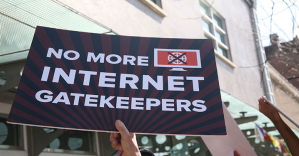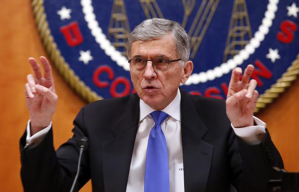
The Federal Communications Commission released details of its net neutrality rules on Thursday, which contains 400 pages of regulations designed to govern Internet traffic. However, critics plan to use those details in a future lawsuit against the federal agency.
According to Jim Puzzanghera of the Los Angeles Times, the regulations, which were approved by the FCC two weeks ago, only totaled eight pages. The rest of the tome consisted of explanations and rationale for the rules as well as statements from the commissioners, including a dissent from Republican Commissioner Ajit Pai totaling 64 pages.
"The order uses every tool in the commission's toolbox to make sure the Internet stays fair, fast and open for all Americans, while ensuring investment and innovation can flourish," the FCC said in releasing the full order.
Puzzanghera reported that the order will be published in the Federal Register, and, barring a preliminary injunction from a court, most of its provisions will take effect 60 days later. The regulations were approved 3-2 on Feb. 26 along party lines; the Democrats in the FCC commission voted in favor of the new rules.
"The main provisions prohibit broadband providers from blocking or slowing delivery of any lawful content through their networks for any reason other than 'reasonable network management' and ban so-called paid prioritization, the sale of faster delivery," Puzzanghera wrote.
However, Michael Pryor, special counsel in the regulatory communications practice at the Cooley law firm in Washington, told Puzzanghera that the FCC rules on net neutrality "will be challenged" in court.
"I think the question is how many people end up challenging it," Pryor said.
The Los Angeles Times reported that lawyers for industry groups and broadband service providers such as AT&T Inc. and Verizon Communications Inc. managed to secure court orders successfully tossing out similar rules twice. John Brodkin of Ars Technica listed some of the opposition's responses to the new FCC order.
"Ironically, this order will likely do nothing to address the fairness issues raised by Democrats and Internet activists," Rep. Marsha Blackburn, R-Tenn., said. "Rather, under the guise of keeping the Internet 'free and open,' they simply advocated for an approach that allows Big Brother to step into the shoes of service providers."
Brodkin reported that Blackburn proposed an "Internet Freedom Act" in Congress that he argued would wipe out the FCC's current rules on net neutrality.
"The government will regulate rates, create its own fast lanes, control the placement of content, and raise fees and taxes," Blackburn argued in her dissent. "If you like your service plan, you will not be able to keep it. The age of ObamaNet is upon us and I hope the government proves better at running a network than a website, but logic would seem to dictate that I not hold my breath."
The Los Angeles Times reported that the latest round of net neutrality rules from the FCC was controversial because they treated broadband providers as "more highly regulated telecommunications services." In addition, the federal agency asserted that its regulations also applied to wireless broadband.
"Clearly it is very much written with litigation in mind," Pryor said.

However, FCC Chairman Tom Wheeler asserted that the new regulations would benefit all Americans.
"The American people reasonably expect and deserve an Internet that is fast, fair, and open," Wheeler said. "Today they get what they deserve: strong, enforceable rules that will ensure the Internet remains open, now and in the future."
The FCC's newest round of net neutrality rules can be accessed on its website.







